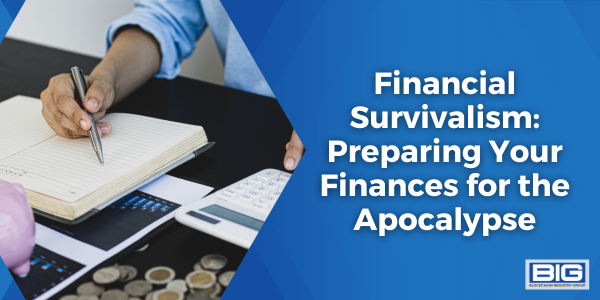
In an uncertain world where economic upheavals, natural disasters, and societal disruptions can occur unexpectedly, it is essential to adopt a financial survivalist mindset.
This article explores the concept of financial survivalism and provides practical strategies to safeguard your finances in preparation for potential apocalyptic scenarios.
Understanding Financial Survivalism
Financial survivalism is a proactive approach to managing your finances with the aim of protecting yourself and your assets in times of crisis. It involves building resilience, diversifying income streams, and acquiring essential skills to navigate through challenging situations. By adopting financial survivalism principles, individuals can increase their chances of financial stability and ensure their ability to sustain themselves during tumultuous times.
Building an Emergency Fund: Your Financial Safety Net
Creating a robust emergency fund is the cornerstone of financial survivalism. An emergency fund acts as a financial safety net, providing you with a cushion to cover unexpected expenses and income loss during a crisis. Aim to save at least six to twelve months’ worth of living expenses in a readily accessible account. This fund will provide you with peace of mind and financial security in the face of unforeseen circumstances.
Diversifying Income Streams: Reducing Dependency on a Single Source
Relying on a single source of income can be risky, especially during times of crisis. Financial survivalism emphasizes the importance of diversifying income streams. Explore opportunities to generate additional income, such as freelancing, part-time work, or starting a side business. Diversification reduces your vulnerability to economic downturns and ensures a more stable financial foundation.
Acquiring Essential Skills: Adapting to Changing Circumstances
In a post-apocalyptic scenario, certain skills become invaluable. Financial survivalism encourages individuals to acquire essential skills that can be useful in times of crisis. Consider learning skills such as first aid, basic survival techniques, gardening, and repair and maintenance skills. These abilities can not only help you during emergencies but also have long-term benefits for self-sufficiency and cost savings.
Investing in Tangible Assets: Hedging against Economic Instability
During uncertain times, tangible assets can serve as a hedge against economic instability. Financial survivalism encourages individuals to allocate a portion of their portfolio to physical assets such as precious metals, real estate, or commodities. These assets retain value and can provide a store of wealth during times of economic volatility.
Establishing a Sustainable Food Supply: Securing Your Basic Needs
In a doomsday scenario, access to food may become limited. Financial survivalism advocates for establishing a sustainable food supply to meet your basic needs. Consider building a stockpile of non-perishable food items, learning about food preservation techniques, or even exploring alternative food sources such as home gardening or aquaponics. Having a reliable food supply ensures that you can sustain yourself and your family during extended periods of disruption.
Securing Important Documents and Valuables: Protecting Your Assets
In the face of an apocalypse, safeguarding your important documents and valuables becomes crucial. Financial survivalism emphasizes the need to secure documents like identification papers, financial records, and insurance policies in a fireproof and waterproof container. Additionally, consider storing copies of these documents in a secure digital format or an off-site location. Protecting your assets ensures that you can quickly recover and rebuild your financial life in the aftermath of a catastrophic event.
Networking and Community Building: Strength in Numbers
Financial survivalism recognizes the power of community and networking during challenging times. Building strong relationships with like-minded individuals can provide mutual support, knowledge sharing, and resource pooling. Join local community groups, attend survivalist workshops or events, and foster connections with people who share similar preparedness goals. Together, you can navigate the challenges and uncertainties that an apocalypse may bring.
A Beginner’s Guide to Investing
—
Art of Negotiation: Getting More for Your Money
—
Building a Strong Credit Score
Embrace the principles of financial survivalism and start implementing these strategies today. Whether an apocalypse occurs or not, the steps you take to prepare your finances will benefit you in various other situations, such as job loss, economic downturns, or natural disasters. By being prepared, you can face the unknown with confidence and have a better chance of securing your financial future in challenging times.
Remember, financial survivalism is about resilience, adaptability, and building a strong foundation to weather any storm that may come your way. Prepare for the worst while striving for the best, and may your journey toward financial survivalism lead you to a future of security, stability, and peace.



